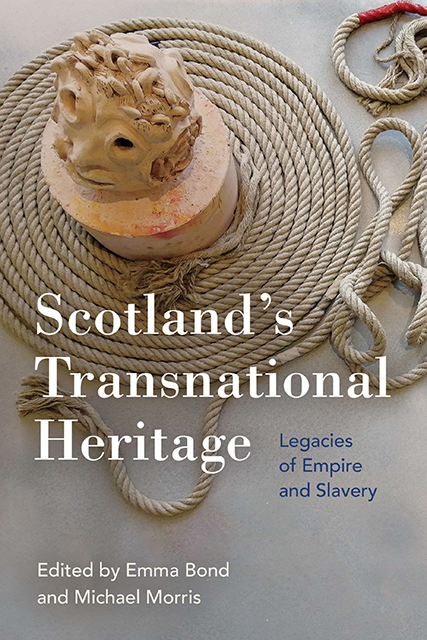Book contents
- Frontmatter
- Contents
- List of Figures
- Notes on Contributors
- Acknowledgements
- Foreword: Fostering Recognition under the Luxury of Amnesia
- Chapter 1 An Introduction to Scotland’s Transnational Heritage: Sites, Things and Time(s)
- Part I Transnational Sites
- Part II Transnational Things
- Part III Transnational Time(s)
- Afterword: Building Solidarity: Moving Towards the Repatriation of the House of Ni’isjoohl Totem Pole
- Index
Chapter 4 - Some Things Can’t be Unknown — Sharing History with My Neighbours
Published online by Cambridge University Press: 25 October 2023
- Frontmatter
- Contents
- List of Figures
- Notes on Contributors
- Acknowledgements
- Foreword: Fostering Recognition under the Luxury of Amnesia
- Chapter 1 An Introduction to Scotland’s Transnational Heritage: Sites, Things and Time(s)
- Part I Transnational Sites
- Part II Transnational Things
- Part III Transnational Time(s)
- Afterword: Building Solidarity: Moving Towards the Repatriation of the House of Ni’isjoohl Totem Pole
- Index
Summary
My ongoing project, Undiscovered Angus, raises awareness of the role played by this part of Scotland in the Transatlantic Slave Trade. This chapter will explore the origins of the work and the creative process and influences that have contributed to it. I will note how and when work moved in unforeseen directions and the developments which have arisen as a legacy of the project. For the purposes of coherence, I am writing as if this all happened in a neat, linear fashion. It didn’t. What follows is the result of a messy conglomeration of ideas, influences, material culture, learning and research. Leaps and curves rather than straight lines.
I blame the BBC. How this all came about
In 2018, I was studying photography at Dundee and Angus College and working on a self-directed project about families and memory. I’d been playing around with ideas about multiple truths, much like the way in which writers such as John Burnside and Janice Galloway explore their individual memories while also recognising that other versions of historical moments exist. One evening I watched a BBC documentary called Slavery: Scotland’s Hidden Shame and heard Adebusola Debora Ramsay talk about ‘collective amnesia’ in relation to Scotland’s disavowal of its role in the Transatlantic Slave Trade. The programme went on to note that slave ships left from Montrose, a town a few miles north of my village. Family, nationhood, multiple memories, collective amnesia, my local area: these ideas started to percolate. I developed my family and memory idea, moving the focus from individuals and families to national or site-specific memories. Specifically, I began to research the role Scotland played in the slave trade.
The BBC documentary referred to a database set up by University College London. When Britain abolished slavery in the British Caribbean, Mauritius and the Cape, slaveholders were able to claim compensation for the loss of enslaved people. The slaveholders provided detailed information in order to process their claims. The Legacies of British Slave Ownership database allows you to search for slaveholders by name and by area. Angus, where I live, is a mix of rural villages and towns.
- Type
- Chapter
- Information
- Scotland's Transnational HeritageLegacies of Empire and Slavery, pp. 55 - 69Publisher: Edinburgh University PressPrint publication year: 2023



